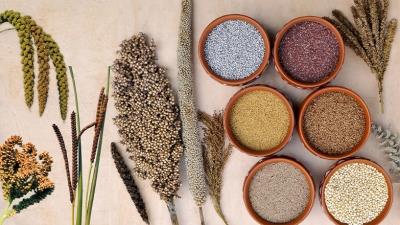
Indian Practice Of Limiting Food Waste, More Veg Diets Can Mitigate Climate Change: Report
A recent Living Planet Report by the World Wide Fund for Nature (WWF) showed that food consumption patterns followed by Indians are the most climate-friendly among the G20 nations.
It stated that if people in other countries adopt the Indian diet, the world would need 0.84 per cent of the Earth to support food production by 2050. The food system is one of the major contributors to global greenhouse gas emissions.
Shravani Mali, Consumer Analyst at GlobalData, a data analytics company, said India has intensified the vegan movement, especially in metropolitan cities in recent years.
“The country's current food consumption practices, emphasises plant-based diets and climate-resilient crops such as millets, which require fewer resources and generate lower emissions compared to meat-heavy diets,” Mali said, adding that,“the transition is also connected to a wider focus on sustainability”.
Citing a recent consumer survey by GlobalData, Mali said that 79 per cent of Indians said that the sustainable or environmentally friendly feature is essential while purchasing food and drinks.
“Traditional Indian diets primarily consist of lentils, grains, and vegetables. These traditional diets, which place an emphasis on seasonal and local produce, are becoming more popular as environmental issues gain more attention. Consequently, with increasing awareness, consumers will look forward to curtailing environmental burdens by adopting traditional dietary practices that prioritise plant-based foods,” Mali said.
Deepak Nautiyal, Consumer and Retail Commercial Director, APAC and Middle East at GlobalData lauded the government for introducing several initiatives to promote environmentally sustainable practices in the country.
He cited the National Millet Campaign and the International Year of Millets (2023) campaigns rolled out by the government to boost the production and consumption of millets. Millets are an environmentally sustainable source of food and nutrition.
In addition, the National Mission for Sustainable Agriculture (NMSA) also aims to improve climate-resilient farming.
Mali said adopting climate-friendly diets, especially Indian sustainable eating habits can be key to address critical global environmental and health challenges.

Legal Disclaimer:
MENAFN provides the
information “as is” without warranty of any kind. We do not accept
any responsibility or liability for the accuracy, content, images,
videos, licenses, completeness, legality, or reliability of the information
contained in this article. If you have any complaints or copyright
issues related to this article, kindly contact the provider above.

















Comments
No comment